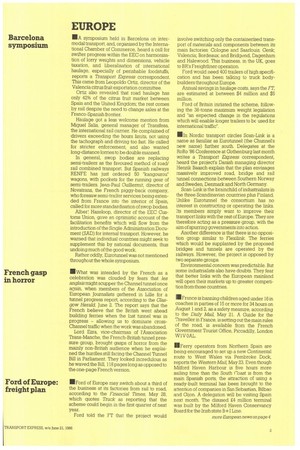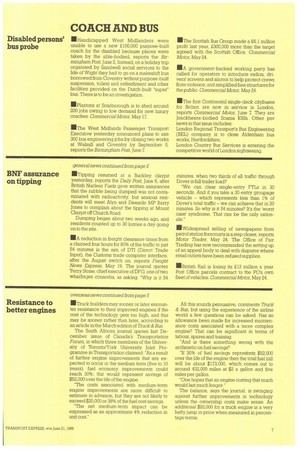Barcelona symposium
Page 17

Page 21

If you've noticed an error in this article please click here to report it so we can fix it.
• A symposium held in Barcelona on intermodal transport, and, organised by the International Chamber of Commerce, heard a call for swifter progress within the EEC on harmonisation of lorry weights and dimensions, vehicle taxation, and liberalisation of international haulage, especially of perishable foodstuffs, reports a Transport Express correspondent. This came from Leopoldo Ortiz, director of the Valencia citrus fruit exportation committee.
Ortiz also revealed that road haulage has only 42% of the citrus fruit market between Spain and the United Kingdom; the rest comes by rail despite the need to change axles at the Franco-Spanish frontier.
Haulage got a less welcome mention from Miguel Sails, general manager of Transfesa, the international rail carrier. He complained of drivers exceeding the hours limits, not using the tachograph and driving too fast. He called for stricter enforcement, and also wanted long-distance lorries to be double manned.
In general, swop bodies are replacing semi-trailers as the favoured method of road/ rail combined transport. But Spanish railways RENFE has just ordered 50 "kangourou" wagons, with pockets for the running gear of semi-trailers. Jean-Paul Guillermit, director of Novatrans, the French piggy-back company, who foresaw semi-trailer services being extended from France into the interior of Spain, called for more standardisation of swop bodies.
Albert Hazeloop, director of the EEC Customs Union, gave an optimistic account of the facilitation benefits which will flow from the introduction of the Single Administration Document (SAD) for internal transport. However, he warned that individual countries might seek to supplement this by national documents, thus undoing much of the good work Rather oddly, Eurotunnel was not mentioned throughout the whole symposium.
IN What was intended by the French as a celebration was clouded by fears that les anglais might scupper the Channel tunnel once again, when members of the Association of European Journalists gathered in Lille for a tunnel progress report, according to the Glasgow Herald, June 2. The report says that the French believe that the British went ahead building ferries when the last tunnel was in progress allowing us to dominate crossChannel traffic when the work was abandoned.
Lord Ezra, vice-chairman of l'Association Trans-Manche, the French-British tunnel pressure group, brought gasps of horror from the mainly non-British audience when he explained the hurdles still facing the Channel Tunnel Bill in Parliament. They looked incredulous as he waved the Bill, 118 pages long as opposed to the one-page French version.
• Ford of Europe may switch about a third of the business at its factories from rail to road, according to the Financial Times, May 28, which quotes Truck as reporting that the scheme could begin in the first quarter of next year.
Ford told the FT that the project would involve switching only the containerised transport of materials and components between its main factories: Cologne and Saarlouis; Genk; Valencia; Bordeaux; and Bridgend, Dagenham and Halewood. This business, in the UK, goes to BR's Freightliner operation.
Ford would need 400 trailers of high specification and has been talking to truck bodybuilders throughout Europe.
Annual savings in haulage costs, says the FT, are estimated at between $4 million and $5 Ford of Britain initiated the scheme, following the 38-tonne maximum weight legislation and "an expected change in the regulations which will enable longer trailers to be used for international traffic".
MI In Nordic transport circles Scan-Link is a name as familiar as Eurotunnel (the Chunnel's new name) further south. Delegates at the RoRo '86 Conference at Gothenburg last month writes a Transport Express correspondent, heard the project's Danish managing director Henrik Baasch explain that the plan envisages massively improved road, bridge and rail tunnel connections between Southern Norway and Sweden, Denmark and North Germany.
Scan-Link is the brainchild of industrialists in the three Scandinavian countries plus Finland. Unlike Eurotunnel the consortium has no interest in constructing or operating the links. :ts members simply want to improve their transport links with the rest of Europe. They are therefore acting as a pressure group, with the aim of spurring governments into action.
Another difference is that there is no opposition group similar to Flexilink The ferries which would be supplanted by the proposed bridges and tunnels are operated by the railways. However, the project is opposed by two separate groups.
Environmental concern was predictable. But some industrialists also have doubts. They fear that better links with the European mainland will open their markets up to greater competition from those countries.
IN France is banning children aged under 16 in coaches in parties of 15 or more for 34 hours on August 1 and 2, as a safety measure, according to the Daily Mail, May 21. A Guide for the Traveller in France, is setting out the main rules of the road, is available from the French Government Tourist Office, Piccadilly, London W1 V CAL.
II Ferry operators from Northern Spain are being encouraged to set up a new Continental route to West Wales via Pembroke Dock, reports the Western Mail, May 23. Even though Milford Haven Harbour is five hours more sailing time than the South Coast is from the main Spanish ports, the attraction of using a ready-built terminal has been brought to the attention of companies in San Sebastian, Bilbao and Gijon. A delegation will be visiting Spain next month. The disused VI million terminal was built by the Milford Haven Conservancy Board for the Irish state B+ I Line. IN Truck builders may sooner or later encounter resistance to their improved engines if the cost of the technology gets too high, and this may be sooner rather than later, according to an article in the March edition of Truck & Bus.
The South African journal quotes last December issue of Canada's Transportation Forum, in which three members of the University of Toronto/York University Joint Programme in Transportation claimed: "As a result of further engine improvements that are expected to occur in the medium term (five to 10 years), fuel economy improvements could reach 30%; this would represent savings of $52,000 over the life of the engine.
"The costs associated with medium-term engine improvements are more difficult to estimate in advance, but they are not likely to exceed $20,000 or 38% of the fuel cost savings.
"The net medium-term impact can be expressed as an approximate 4% reduction in unit cost." All this sounds persuasive, comments Truck & Bus, but using the experience of the airline world a few questions can be asked. Has an allowance been made for increased maintenance costs associated with a more complex engine? That can be significant in terms of labour, spares and training.
"And is there something wrong with the arithmetic on fuel savings?
"If 30% of fuel savings represents $52,000 over the life of the engine then the total fuel bill will be about $173,000, which comes out to around 432,000 miles at $2 a gallon and five miles per gallon.
"One hopes that an engine costing that much would last much longer."
The balance, says the journal, is swinging against further improvements in technology unless the ownership costs make sense. An additional $20,000 for a truck engine is a very hefty jump in price when measured in percentage terms.






















































































